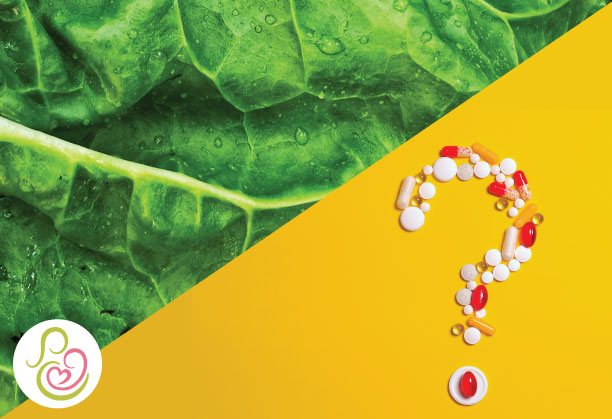Whether you’re currently pregnant or thinking about becoming pregnant, most women find their heads full of swirling questions. All parents want the best for their children, and that tends to mean lots and lots of research. Which doctor should I use? Do I want a full travel system or just a car seat to start out? Which car seat is the safest? And the list goes on…
Let us help clear up one question and save you from all the research. Folic acid or folate–are they the same? Is one more important than the other? Which one do I need?
The short answer is no, they aren’t the same, but they function very similarly in the body, and all women of childbearing age should take 400 micrograms of folic acid daily AND enjoy a varied diet rich in folate.
Now for the nitty-gritty.
Folate is an umbrella term that refers to both the naturally-occurring forms of vitamin B-9, and the synthetic vitamin folic acid. The body uses B vitamins to create new cells, thus its extreme importance for pregnant women. Folate-rich foods should be incorporated into the diet regularly. Ingredients such as dark leafy greens, black-eyed peas, and beef liver are great options. However, let’s be real, most pregnant women aren’t craving beef liver or black-eyed peas. Plus, it’s a bit tricky to know exactly how much folate you ingest through food consumption alone.
Enter–folic acid. Folic acid is a synthetic form of folate which is super easy to add to your daily regimen through the vitamin aisle at your local supermarket or pharmacy. You can also find folic acid in those “fortified” grain products around the store. Manufacturers use folic acid to fortify foods rather than folate because folic acid can withstand the cooking process better than folate.
One last tidbit, folic acid and folate are water-soluble. Meaning your body takes in and uses what is needed, then naturally disposes of the excess.
So the question really shouldn’t be one versus the other. The facts of the matter are that both folic acid and folate are extremely important for all women of child-bearing age, and both should be incorporated daily into your diet to receive the most benefits for you and your [future] unborn baby.
Resource: https://www.medicalnewstoday.com/articles/327290#sources




